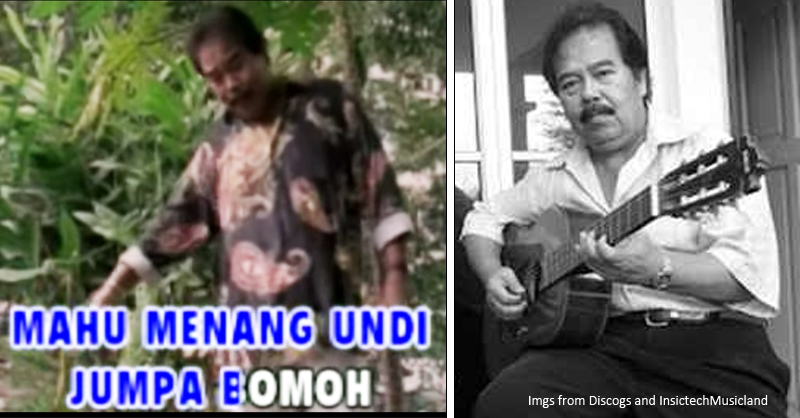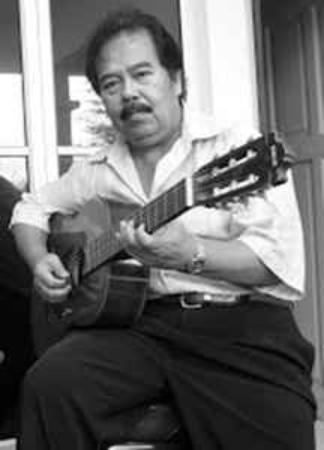Meet Hang Mokhtar, the funniest 80s Malaypop singer you never heard of

- 206Shares
- Facebook176
- Twitter7
- LinkedIn4
- Email5
- WhatsApp14
When you see a name with a ‘Hang’ in front, you know they’re pretty epic. There’s Hang Jebat, Hang Tuah, Hang Li Po, Hang Nadim, Hang Lekir, Hang Lekiu… you get the idea. Well today, let’s talk about one more legend: Hang Mokhtar.

Some of our older readers might remember who he was, but in case the guitar and the shirt didn’t hint at it already, Hang Mokhtar was a pretty popular singer in 1980s Malaysia. Despite his lady-killer looks though, the genre he became known for was not quite John Mayer, but more Weird Al. And instead of making fun of pop culture references…
His most popular songs back then complained about Malaysian roads
Hang Mokhtar was just his stage name, by the way. Born in Malacca, Mohtar Ab Latiff was known for his humorous songs and parodies, although he did produce and sing more mainstream songs. To really grasp Hang Mokhtar’s flavor, here’s one of the songs that he was popular for:
If the music sounds a bit Chinese to you, there’s a reason for that. The backing music for ‘Lobang Korek‘ was from ‘Shanghai Bund’, a Cantonese TV show that was popular then. The lyrics, which complains about the constant roadworks despite numerous toll gates, were sung in a Chinese Malay style, fitting the theme. The video seems to be a revised version, however. The original version of the song incorporated Hokkien terms, with the words pronounced in a more stereotypical Chinese way, and it name-dropped Telekom and LLN as the culprits for road holes:

But perhaps his biggest hit was ‘Ayoyo Samy’, mentioned in most news reports we found him in. There’s no doubt that the Samy here refers to Samy Vellu, who was Works Minister at that time, and the song followed the announcement of a 100% toll hike. People were unhappy, politicians argued over it in Parliament, and this masterpiece was born:
The song became a hit, and not just because of it’s catchiness and lyrical genius. ‘Ayoyo Samy’ became an anthem at various demonstations against the toll hike in the 80s, as thanks to the conversational Malay used, it was easy for the protesters to sing along to. While none of us today wouldn’t even dream of cha-chaing this close to ‘sedition’, Ayoyo Samy’s popularity spawned a unique genre that can only described as ‘grievances against Samy Vellu pop’. A number of other people released songs that complained about the toll hike, with inspiring titles like ‘No Way Samy’, ‘Sorry La Samy’, and ‘Thank You Samy’, but unfortunately we can’t seem to find them online.
Despite the offensiveness of Ayoyo Samy by today’s standards, it wasn’t seen as problematic. That honor actually goes to another one of his songs…
His song on Sikhs and cows got banned in 1987
The inspiration for Hang Mokhtar’s songs didn’t just come from bad roads. The singer found inspiration from everyday observations of Malaysian life, like the joy of our night markets…
…to our people’s reliance on bomohs…
…to the polygamous tendencies of Datuks.
Basically anything’s fair game for Hang Mokhtar’s lighthearted musical commentary, but if any of his songs stirred a bit of trouble, it’s the ones with racial undertones. We don’t know if racism was the reason behind why there were two versions of Lobang Korek, but another song of his, ‘Kecik-Kecik, Lembu Jaga‘ (When Small, Take Care of Cows), was banned in 1987, as told by the singer himself in one of his blog posts.
The original version of the song was set to the tune of popular Hindi song ‘Pukarta Chala Hoon Main‘, and it apparently implied certain things about the Sikh community’s sexual habits (although he also asked listeners to not take the song too seriously in the ending verses). Since the singer himself had asked for people to not upload the song online, we won’t be linking it here, but you can try finding it yourself if you want.
The song was later re-released with a Negeri Sembilan dialect – “Kocik-Kocik Jago Kobau” (Taking Care of Buffaloes when Little) – and the lyrics are far more PC, reminiscing about the hard life as a farmer’s son and how easy kids these days have it.
Still a banger. Anyhoo…
Hang Mokhtar passed on in 2018, but his songs still make us smile today

After 1987, Hang Mokhtar mostly stayed out of the public’s attention up until about a decade ago, when it was wrongly reported that he died. The one who actually passed on then was Abang Mokhtar, a singer for Goodman Brothers, but Hang Mokhtar’s image was erroneously used instead. Despite being out of the public’s eye for so long, his passion for music led him to continue composing, writing lyrics, and producing albums well into the 2000s. He continued to sing live in hotels, clubs, and exclusive venues, with Sepekan di Tanjung Pinang – the last album he was known to produce – being released in 2009.
“Despite my glory days as a singer can be said to be over with, I’m still in love with this field… It’s hard for me to abandon the field that I’ve been in since 1969.” – Hang Mokhtar, in a 2009 interview with Utusan.
In 2017, it was reported that Hang Mokhtar suffered from Parkinson’s, and in 2018, Hang Mokhtar passed on at the age of 70. But his legacy lives on. You can still hear his songs today, and many of them remain as catchy and relevant as ever. Being a true artiste, Hang Mokhtar had mentioned that he didn’t mind people not recognizing his face, as long as they remember his songs. And his songs – which tackled issues in a lighthearted, easily relatable manner – are definitely worth revisiting.
“…to express one’s feelings through singing and writing is a thousand times better than running amok which sacrifices lives.” – Hang Mokhtar, as quoted in “Between Tongues: Translation And/of/in Performance in Asia“.
Co-written by Ray and Badd.
- 206Shares
- Facebook176
- Twitter7
- LinkedIn4
- Email5
- WhatsApp14
